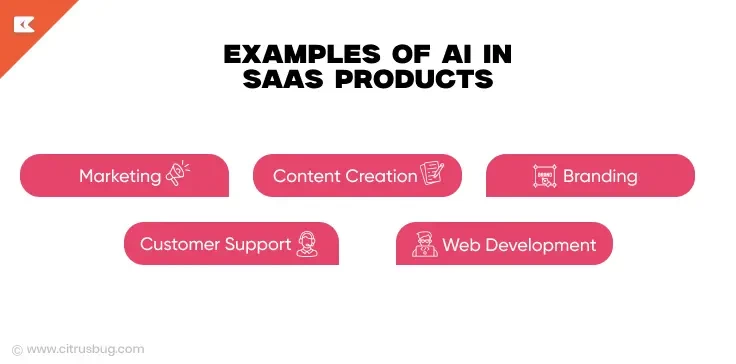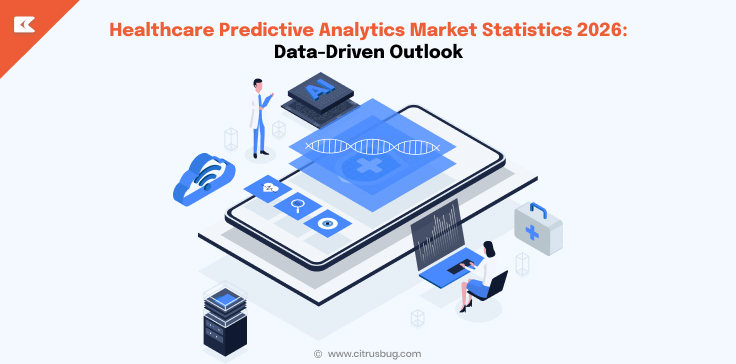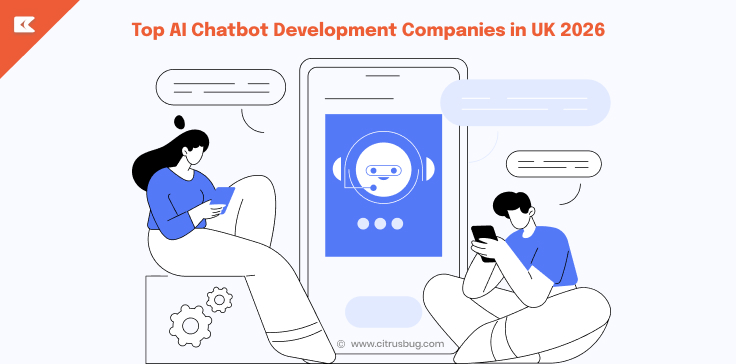AI-Powered SaaS Development: How AI Transforms SaaS Products
- July 24, 2024
-
5524 Views
- by Ishan Vyas
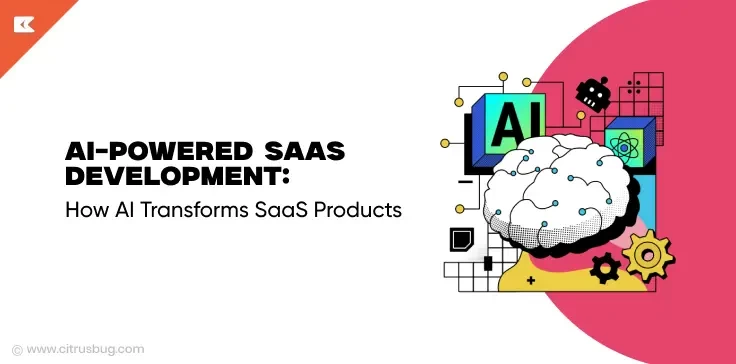
The AI industry reached $184 billion in 2024 and is predicted to increase to $ 826 billion by 2030. Does this sound ridiculously high? It is not surprising at all. AI has altered the world and shows no signs of slowing down anytime soon.
AI has been applied in different industries, dramatically revolutionizing company operations and workflows. According to a study, advertising and media have the greatest market share for AI, with healthcare, BFSI, and fintech coming next.
The SaaS industry is no exception. SaaS was initially intended to give organizations cost-effective and convenient solutions to their business needs. Can you imagine your workplace without products like Zoom, Dropbox, Slack, Google, and Microsoft? It’s a disorganized mess.
And what happens when you combine these practical tools with the efficiency of AI? Yes, you’ll get even more efficient results.
In this post, we’ll examine how AI and SaaS can operate together and how SaaS products can profit from them.
Benefits of AI for SaaS products
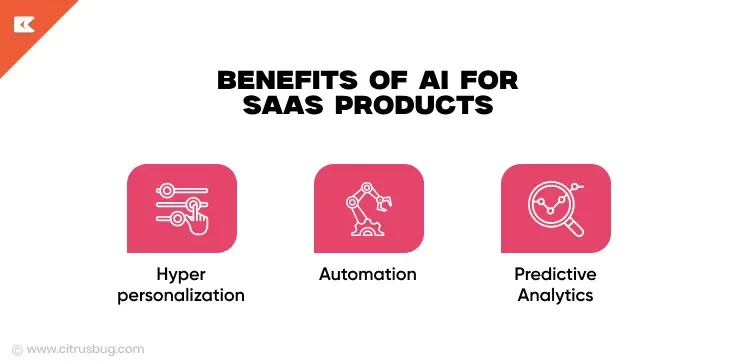
Customer demands are ever-changing. But one thing is always set in stone – it’s the fact that customers always have a lot of demand and expectation from their products. With multiple companies vying for their attention (and money), they want only the best. If your product is not the best that the market offers, you’ll be gone from their list.
Luckily, with AI, SaaS companies can meet these demands in the most efficient way possible. This is because they provide some key features that can make your SaaS products better than before. Some of it are:
Hyper personalization
Want to know what the most in-demand feature of SaaS products is? It’s personalization. Before, customers were treated as one single homogeneous entity. They receive the same message, regardless of their age, gender, or location.
But through personalization, businesses can give suggestions or tailored experiences that are specifically fitted to your individual customer’s needs and tastes.
How does hyperpersonalization differ from personalization? Well, hyperpersonalization is essentially an even more detailed and intensive analysis of data. Unlike before when you could only gather customers’ demographics, you can now collect data such as:
- Browsing activity (what websites you usually visit, how much time you spend on one page etc.)
- Purchase history (what items have you bought before, what items do you typically buy)
- Purchase behaviour (do you buy full price or only when there’s a sale, do you prefer free shipping or 50% off voucher, do you pay using this specific card, etc.)
- Behaviour towards your products (do you add a lot of items to cart, do you only browse but don’t purchase anything)
Hyperpersonalization can also do real-time analysis of customer’s data. They can see your current location, the weather you are experiencing right now, shops that are close to you, and so on.
This leads to even more tailored suggestions. For example, with personalization, you can see gym clothes ads when you click on an exercise video. But with hyperpersonalization, you can see thermal gym clothes ads since you are experiencing the winter season right now.
All of these intensive data gathering and analysis are easily done through AI. AI can use its algorithms to instantly analyze a vast amount of customer data and provide insights in just a short time.
You can see this on Spotify. The app provides its users with tailored song or artist suggestions based on their playlists, last played songs, or preferred music genres. This leads to a more enjoyable user experience, as users can listen to songs and discover new artists that fit their preferences.
Automation
Many SaaS products are created to autonomously take care of menial tasks. By harnessing AI, automation tools can efficiently handle time-consuming, repetitive tasks while minimizing human error. To better understand how AI drives such innovations, consider exploring an AI course and stay ahead in this evolving field.
Automation is a great help for any industry. Have a long list of leads that you need to contact for your email marketing? You can streamline your prospecting by using cold automated email tools that automatically replace and fill in information in your messages. You can also set them to send these messages at whichever time or day you prefer.
In the manufacturing industry? You can also use tools to track your inventory and automatically create invoices from orders.
Automation can also improve graphic design workflow. Tools like TimeBolt have an AI-powered feature where the AI can detect long silences in your video footage and automatically cut them out. This results in more concise videos that are more engaging to your audience. You can also use automation when streaming videos through the JWPlayer alternative to save time and effort by automating tasks like video scheduling, analytics, and player customization.
Adding AI to the mix can greatly improve the automation capabilities of your software. An example is Zendesk, which is a customer support platform. They use AI to analyze customer concerns to automatically route them to the correct agent. AI can also identify which of the messages are more urgent and automatically put them at the top of the line.
Predictive Analytics
Predictive analytics isn’t a new trend. Companies have been using data to make business choices for a long time. However, AI has helped it develop by leaps and bounds. The volume of client data has risen, as have the capabilities of software and technology. When combined with AI’s capabilities, data mining and analytics are faster and smarter than before.
One example is Xero, an accounting software. They use AI to predict cash flow trends and analyze your financial performance. Another one is Zia, Zoho CRM’s AI tool, which uses AI to find trends in customer data and behavior and forecast future sales trends.
Examples of AI in SaaS products
From invoicing to content creation, to analytics and customer support – various SaaS products can greatly benefit from AI. Some examples are:
Marketing
AI can help in analyzing customer behavior, segmenting customers into tailored groups, or creating personalized content which can greatly optimize a marketing campaign, and partnering with a SEM agency can further enhance these insights by translating data into high-performing paid search and advertising strategies.
One example is HubSpot with its Marketing Hub, which is powered by AI. Through this feature, a user can automate multi-channel campaigns. This means email or SMS contacts can get automatically added to specific triggered campaigns when they are activated by actions such as email opens or link clicks. However, when automating SMS outreach, it’s important to ensure TCPA compliance to avoid legal risks and maintain trust with your audience.
This helps marketers deliver targeted messages to the right audience, thus maximizing ROI.
Content Creation
Let’s have a brief game. What comes to mind when you hear the term “AI?” You are one of many who have considered ChatGPT. It’s the most well-known AI technology, which is most likely due to the constant discussion about it on the internet.
And indeed, AI features in the same vein as ChatGPT have been added to various industries – whether you need graphics, videos, music, or captions. Tools like Visme have also integrated AI capabilities to help users create more sophisticated and professional design content quickly and easily.
An example is one of the most popular image generator tools, Midjourney. This AI tool can produce images through a user’s prompts. Whether you need a lifelike image, a watercolor painting style, or an abstract one, Midjourney can generate one provided you give it a detailed prompt.
Need an actor to speak in your videos? No need to hire one with Synthesia. This AI tool can provide a virtual avatar that can move and speak just like a real human. You can even change the accent, look, and gestures of your avatar.
Of course, AI is not just limited to generation. They can also help in editing as they can manually cut out people from the background, automatically color correct, or turn a low-res image into a high-quality one. All of this helps in creating more engaging content in less time.
Branding
Looking for a logo for your business? You don’t have to spend a long time designing as AI logo generators can help. Similar to other AI tools, logo generators are powered by prompts. Users just need to provide a great description of their business to get suitable results.
Can’t come up with a witty brand name? AI can also help with their business name generator tools. These AI tools also offer customization, as you can generate professional or funny names, depending on your choice.
Branding starts with a solid business plan, and you got it, AI is also present there, helping you generate creative logos. You can use tools like ChatGPT, Live Plan, or Watson Assistant to generate business templates or give you a list of business ideas. With the right ChatGPT prompts, you can even tailor responses to suit specific industries or niche markets.
Customer Support
Customer satisfaction is the most important part of getting your customer’s loyalty. Thankfully, AI helps in streamlining your customer support processes.
You can see this in AI virtual assistants and chatbots. Customers now don’t have to wait for an agent to answer their concerns as 24/7 AI chatbots are available. They can provide basic answers instantly, route customers to the correct FAQ or tutorial videos, or just do a basic filtering to know which agent to direct the customer to.
AI virtual assistants on the other hand can answer more complex concerns. They can also converse in a more “human-like” fashion and give personalized answers based on the customer’s data. For more advanced quiz features and integrations, visit Quiz Maker Plugin.
Web Development
While no-code site builders were popular already due to their convenience and ease of use, the incorporation of AI made it even easier to create a website. Moreover, paired with web design trends, the process has become more efficient, allowing for designs that are both innovative and tailored to current digital aesthetics
Let’s take a look at Wix. They have an AI-powered website builder where you can create a website just based on your text prompt. The AI will then take your info, keywords, and previous data to give you a tailored website that fits your niche or audience’s preferences.
E-commerce websites can also be more optimized through AI. Unbounce, for example, has an AI tool designated to create more tailored pop-ups and landing pages to maximize customer engagement.
Wrapping Up
The integration of AI into SaaS products will continue to evolve, particularly as AI is polished even more. AI will not only enhance the solutions that SaaS products currently provide but potentially open up new possibilities in the future.
However, just like with any tool, responsible and ethical use of AI should still be followed. If you’re planning to adopt AI into your SaaS product, make sure you get the right knowledge to execute it properly. You can partner with us for AI & ML development services. We ensure that our expertise can be the perfect guide for you.





 SaaS Development
SaaS Development Web Application Development
Web Application Development Mobile Application Development
Mobile Application Development Custom Software Development
Custom Software Development Cloud Development
Cloud Development DevOps Development
DevOps Development MVP Development
MVP Development Digital Product Development
Digital Product Development Hire Chatbot Developers
Hire Chatbot Developers Hire Python Developers
Hire Python Developers Hire Django Developers
Hire Django Developers Hire ReactJS Developers
Hire ReactJS Developers Hire AngularJS Developers
Hire AngularJS Developers Hire VueJS Developers
Hire VueJS Developers Hire Full Stack Developers
Hire Full Stack Developers Hire Back End Developers
Hire Back End Developers Hire Front End Developers
Hire Front End Developers AI Healthcare Software Development & Consulting
AI Healthcare Software Development & Consulting Healthcare App Development
Healthcare App Development EHR Software Development
EHR Software Development Healthcare AI Chatbot Development
Healthcare AI Chatbot Development Telemedicine App Development Company
Telemedicine App Development Company Medical Billing Software Development
Medical Billing Software Development Fitness App Development
Fitness App Development RPM Software Development
RPM Software Development Medicine Delivery App Development
Medicine Delivery App Development Medical Device Software Development
Medical Device Software Development Patient Engagement Software Solutions
Patient Engagement Software Solutions Mental Health App Development
Mental Health App Development Healthcare IT Consulting
Healthcare IT Consulting Healthcare CRM Software Development
Healthcare CRM Software Development Healthcare IT Managed Services
Healthcare IT Managed Services Healthcare Software Testing services
Healthcare Software Testing services Medical Practice Management Software
Medical Practice Management Software Outsourcing Healthcare IT Services
Outsourcing Healthcare IT Services IoT Solutions for Healthcare
IoT Solutions for Healthcare Medical Image Analysis Software Development Services
Medical Image Analysis Software Development Services Lending Software Development Services
Lending Software Development Services Payment Gateway Software Development
Payment Gateway Software Development Accounting Software Development
Accounting Software Development AI-Driven Banking App Development
AI-Driven Banking App Development Insurance Software Development
Insurance Software Development Finance Software Development
Finance Software Development Loan Management Software Development
Loan Management Software Development Decentralized Finance Development Services
Decentralized Finance Development Services eWallet App Development
eWallet App Development Payment App Development
Payment App Development Money Transfer App Development
Money Transfer App Development Mortgage Software Development
Mortgage Software Development Insurance Fraud Detection Software Development
Insurance Fraud Detection Software Development Wealth Management Software Development
Wealth Management Software Development Cryptocurrency Exchange Platform Development
Cryptocurrency Exchange Platform Development Neobank App Development
Neobank App Development Stock Trading App Development
Stock Trading App Development AML software Development
AML software Development Web3 Wallet Development
Web3 Wallet Development Robo-Advisor App Development
Robo-Advisor App Development Supply Chain Management Software Development
Supply Chain Management Software Development Fleet Management Software Development
Fleet Management Software Development Warehouse Management Software Development
Warehouse Management Software Development LMS Development
LMS Development Education App Development
Education App Development Inventory Management Software Development
Inventory Management Software Development Property Management Software Development
Property Management Software Development Real Estate CRM Software Development
Real Estate CRM Software Development Real Estate Document Management Software
Real Estate Document Management Software Construction App Development
Construction App Development Construction ERP Software Development
Construction ERP Software Development





